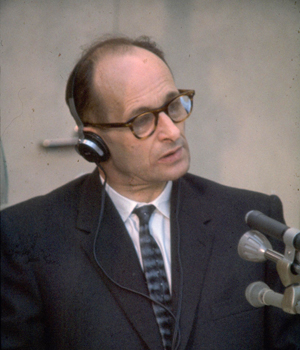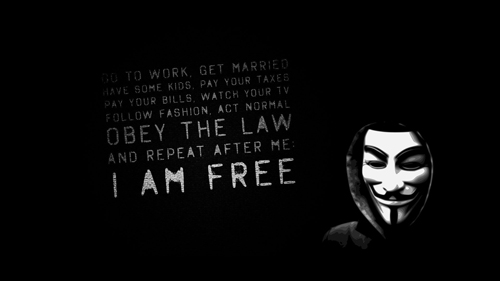
Your complimentary articles
You’ve read one of your four complimentary articles for this month.
You can read four articles free per month. To have complete access to the thousands of philosophy articles on this site, please
Books
Disobey! by Frédéric Gros
Tim Moxham urges us to disobey!
When we look around the world today, we often get a feeling of helplessness. States take decisions that place economics before citizens. Globally, corporations are denying basic living wages for their employees and acting in environmentally hazardous ways. How is it that they’re getting away with these things? And why, overall, are we obeying often unjust systems?
Frédéric Gros, a professor of Philosophy at the University of Paris and Paris’s Institute of Political Studies, addresses these questions in his emotive and pithy book, Disobey (2020). His analysis of obedience argues that to obey is to be an ‘automaton’ and that only through mental disobedience can we reassert our humanity.
Disobey is a hard book to digest – not because it is too abstract or unreal, rather the opposite: it faces you with a hard reality that’s difficult to swallow.
The Problem of Disobedience
Gros recognises the near impossibility of effective physical disobedience in the world. It is virtually impossible for people to disobey in modern societies. Not literally, since people do break the law and disobey generally, but in the sense that the costs are far too high for disobedience to be a plausible lifestyle choice. For instance, if your boss asks you to do certain things, and you continually refuse, you'll likely be fired. But in getting fired, you jeopardise your life; you won’t have an income for food or rent. The only choice you have, then, is to fulfil your boss’s commands.
This is a set aspect of human life for almost everyone: sell your labour to live. However, Gros charges us with being too obedient, obeying commands without hesitation, or without question. Indeed, he says we enslave ourselves to those commanding us since “The only reason why the slave obeys is that he is given an order” (p.32). Obedience in this sense is that of an automaton or a machine. We fulfil all commands simply because we have been commanded.
Gros does not deny that in order to keep your job you need to fulfil your boss’s commands. Instead, he wants us to revolt against our ‘obedience mentality’: to question the commands being given to us, and to think for ourselves about them. We aren’t machines. So, for Gros “the real revolution must begin with an internal divestment” (p.40) – a disobedience of the mind. Yet even here he does not want us to disobey at the expense of our lives or livelihoods. What he says we should be doing, is obeying ‘ a minima’ (minimally) or with ‘ascetic obedience’, or by offering ‘obedience with bad grace or ill will’. Although we live in a world where we’re forced to sell our labour and obey the commands of others, we should be rebellious in our obedience. Show our dissatisfaction in the work we are required to do. Grudgingly accept obedience. Do not give yourselves over wholly to what is asked of you by society. Obey your society and culture no more than is necessary.
The Desire for Obedience
Gros encourages us to think for ourselves and not simply obey, then. But one question looms over the whole argument: Why haven’t we already disobeyed? In other words, why is it that we obey without hesitation and let the immoral actions of those in power generally go unchallenged? Or as Gros asks, “why is it easy to come to an agreement on the desperate state of the world today, and yet so hard to disobey?” (p.9).
Lots of ideas are drawn out in Disobey to explain why we may want to obey without hesitation: it may be habitual for us; historically, Christianity and political culture have taught us that obedience is virtuous and just; and, moreover, many people in power get pleasure from dominating others, that is, making them obey them, so they have a vested interested in perpetuating this system. Gros gives several specific snippets of thought concerning why we have a desire to obey, too. For instance, he opens the book with an analysis of Fyodor Dostoyevsky’s poem ‘The Grand Inquisitor’ in The Brothers Karamazov (1880), which makes man out to be weak and in need of higher authority. As to why exactly we want or need this higher authority Gros doesn’t seem to make explicit. We can, however, infer that it’s because we do not want to be free. I guess the kind of freedom we don’t want is the absolute existential freedom the nineteenth century existentialist Søren Kierkegaard discusses – the freedom in which we are the sole orchestrators of our decisions, even when there is not always (if ever) a clearly correct way to act. Unfortunately, the ambiguity of action is tiresome in a world where humans strive for certainty. In giving oneself over to the commands of another, then, this ‘dread’ of our freedom, and the responsibility that goes with it, is suppressed. There is, I feel, a strong undercurrent in human life that we do not want to be absolutely responsible for our actions. By giving up my freedom ‘I am not responsible; I simply obey orders’. So when we have mental obedience, we believe we have given up this responsibility to decide how to act.

Adolf Eichmann at his public trial, 1961
Gros also plainly believes this: he writes, “obedience removes responsibility and gives people the comfort of not having to account to anyone for their actions” (p.89). However, Gros does not think that those who obey without hesitation have actually given up responsibility – they just think and feel as if they have. But simply believing we’ve given up responsibility does not mean we have actually done so. Gros uses the trial of Adolf Eichmann as an example. Eichmann was one of the main administrators of the Nazi Holocaust. In his trial Eichmann argued that he was not guilty because he was simply ‘following orders’. He claimed that he had no responsibility for the Final Solution since he only managed the logistics for the trains taking people to the gas chambers. He agreed that the Final Solution was immoral, but argued that he had taken an oath of obedience, and if he disobeyed, then he would have gone against his oath. [See also the Brief Life of Hannah Arendt in this issue. Ed.]
To Gros, Eichmann was hiding behind his obedience in order to absolve himself from responsibility. Yet even though he passively obeyed orders he supposedly disagreed with, he is still responsible for his actions. Gros highlights that even though Eichmann may have been in practically inescapable conditions demanding obedience to evil orders, he could have for example acted in an ‘ascetic obedient’ capacity, mismatching the train times to cause confusion, or carrying out his orders slowly and inefficiently, to try to slow down what he knew to be happening. In other words, he could have obeyed the commands but disobey in his mind. But in reality, by acting like a machine, and not reflecting on the commands he was obeying, Eichmann “was rightly condemned because he made the choice of stupidity, he preferred not to think, not to know, not to see” (p.101). We are still responsible for our obedience even if we do not want to believe that we are. We are, for instance, responsible when we simply obey without hesitation. Commanded actions often have moral consequences, so in passively accepting orders, we are morally responsible.

For Gros, what is generally needed is for us to purge ourselves of our desire for obedience, and to reaffirm our selves in disobedience. What Gros wants us to do is think: to not obey for the sake of obedience, but rather, to question whether the action you’ve been commanded to perform is right. If it’s not, then, since we live in a world of impossible disobedience, do everything in your power to hinder the efficacy of the command.
This book gives a deep insight into how we can disobey and bring about a better world rather than passively accept the reality we’re living in. The catch is that it’s up to us. We have to deny our own habitual obedience. We have to think critically about the world. We are the ones who must not act with passive obedience, but instead exert ascetic obedience. Only by doing these things can we reassert the power of the disempowered in society, suppress the power of the wrongly empowered, and come to live in a world that’s good and wholesome for everyone.
© TWJ Moxham 2021
Tim Moxham has a Master’s in Philosophy from the University of Sheffield.
• Disobey: The Philosophy of Resistance, by Frédéric Gros, Verso, 2020, 224 pages, $20 paperback, ISBN: 978-1788736312









